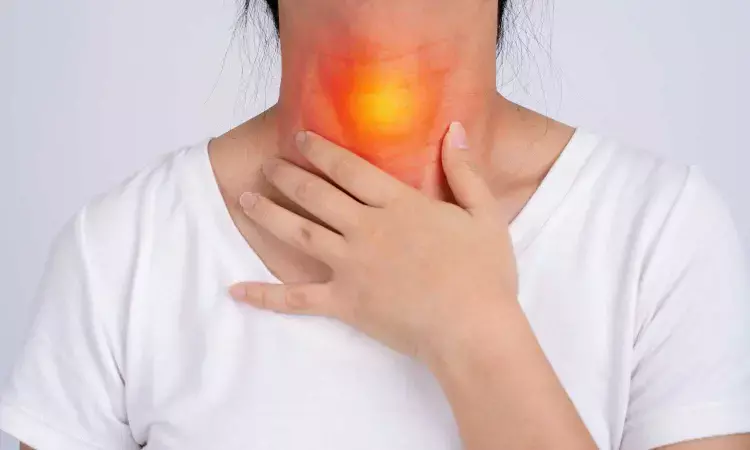- Home
- Medical news & Guidelines
- Anesthesiology
- Cardiology and CTVS
- Critical Care
- Dentistry
- Dermatology
- Diabetes and Endocrinology
- ENT
- Gastroenterology
- Medicine
- Nephrology
- Neurology
- Obstretics-Gynaecology
- Oncology
- Ophthalmology
- Orthopaedics
- Pediatrics-Neonatology
- Psychiatry
- Pulmonology
- Radiology
- Surgery
- Urology
- Laboratory Medicine
- Diet
- Nursing
- Paramedical
- Physiotherapy
- Health news
- Fact Check
- Bone Health Fact Check
- Brain Health Fact Check
- Cancer Related Fact Check
- Child Care Fact Check
- Dental and oral health fact check
- Diabetes and metabolic health fact check
- Diet and Nutrition Fact Check
- Eye and ENT Care Fact Check
- Fitness fact check
- Gut health fact check
- Heart health fact check
- Kidney health fact check
- Medical education fact check
- Men's health fact check
- Respiratory fact check
- Skin and hair care fact check
- Vaccine and Immunization fact check
- Women's health fact check
- AYUSH
- State News
- Andaman and Nicobar Islands
- Andhra Pradesh
- Arunachal Pradesh
- Assam
- Bihar
- Chandigarh
- Chattisgarh
- Dadra and Nagar Haveli
- Daman and Diu
- Delhi
- Goa
- Gujarat
- Haryana
- Himachal Pradesh
- Jammu & Kashmir
- Jharkhand
- Karnataka
- Kerala
- Ladakh
- Lakshadweep
- Madhya Pradesh
- Maharashtra
- Manipur
- Meghalaya
- Mizoram
- Nagaland
- Odisha
- Puducherry
- Punjab
- Rajasthan
- Sikkim
- Tamil Nadu
- Telangana
- Tripura
- Uttar Pradesh
- Uttrakhand
- West Bengal
- Medical Education
- Industry
Radioiodine therapy improves relative survival rates of differentiated thyroid cancer patients: Study

Differentiated thyroid cancer patients who receive radioiodine (RAI) treatment after surgery have increased relative survival rates compared to those who do not receive the treatment. According to new research published in the April issue of The Journal of Nuclear Medicine, the clear trend for a higher long-term survival rate is observed in subgroups of patients with low- and intermediate-risk disease, while there is special benefit in high-risk disease. These findings confirm the benefit of RAI therapy for thyroid cancer patients and provide useful information for physicians to consider when determining optimal treatment.
RAI therapy has been a thyroid cancer treatment for more than 80 years. It is commonly accepted that RAI therapy after surgery reduces recurrence rate and improves long-term survival in high-risk groups of differentiated thyroid cancer. For low- to intermediate-risk differentiated thyroid cancer, however, the evidence is sparse and partially conflicting.
“Due to this lack of evidence, whether or not radioiodine therapy is an optimal treatment course for low- to intermediate-risk patients is a matter of controversial debate. The analysis of real world data may help to guide decisions,” stated Henning Weis, MD, PhD, nuclear medicine physician in the Department of Nuclear Medicine at University Hospital of Cologne in Cologne, Germany. “In our study, we retrospectively examined relative survival-which compares how long people with a disease survive to how long people without the disease survive-of patients who did and did not receive RAI therapy.”
More than 101,000 patients were identified through the Surveillance, Epidemiology, and End Results Program database. Differentiated thyroid cancer cohorts were divided based on histology (classical papillary thyroid cancer [PTC], aggressive variants of PTC, follicular thyroid cancer [FTC], and minimally invasive FTC). These cohorts were then stratified into the following categories: very low risk, low risk, intermediate risk, and high risk. Relative survival was determined for each subgroup.
The relative survival rate was higher or tended to be higher in most subgroups undergoing RAI therapy than in subgroups not undergoing RAI therapy. In high-risk differentiated thyroid cancer, benefits in relative survival of up to 30.9 percent were observed. For larger tumor size or lymph node involvement in classical PTC, a 10-year relative survival benefit of 1.3–2.0 percent in the RAI subgroup was noted. Even for low-risk minimally invasive FTC, the 10-year relative survival rate tended to be higher by 2.0 percent. Relative survival was not negatively affected in any RAI subgroup compared to not undergoing RAI.
“These results may contribute to a valid estimation of the benefit of radioiodine therapy on survival in thyroid cancer patients depending on initial risk classification and therefore support nuclear medicine or endocrine physicians in making adequate treatment recommendations,” said Matthias Schmidt, MD, FEBNM, nuclear medicine physician in the Department of Nuclear Medicine at University Hospital of Cologne.
He continued, “After spending about 10 years for the development of a guideline on thyroid cancer, we consider the present publication as a very important analysis, in order to describe the effect of radioiodine therapy.”.
Reference:
Henning Weis, Jasmin Weindler, Katharina Schmidt, Martin Hellmich, Alexander Drzezga and Matthias Schmidt, Impact of Radioactive Iodine Treatment on Long-Term Relative Survival in Patients with Papillary and Follicular Thyroid Cancer: A SEER-Based Study Covering Histologic Subtypes and Recurrence Risk Categories, Journal of Nuclear Medicine, https://doi.org/10.2967/jnumed.124.269091.
Dr Kamal Kant Kohli-MBBS, DTCD- a chest specialist with more than 30 years of practice and a flair for writing clinical articles, Dr Kamal Kant Kohli joined Medical Dialogues as a Chief Editor of Medical News. Besides writing articles, as an editor, he proofreads and verifies all the medical content published on Medical Dialogues including those coming from journals, studies,medical conferences,guidelines etc. Email: drkohli@medicaldialogues.in. Contact no. 011-43720751


